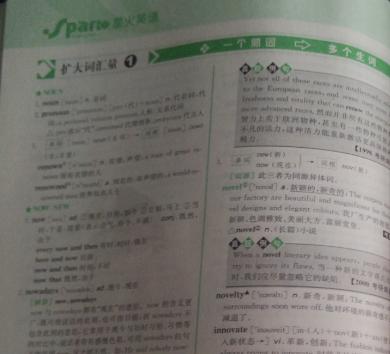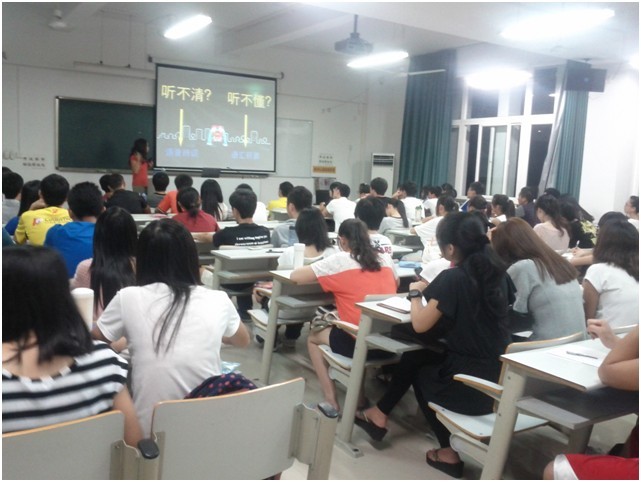 返回
教育头条
返回
教育头条

英语六级考试真题练习分享 英语四六级报名
下面小编跟大家一起了解英语六级考试真题练习分享,希望对大家的学习有所帮助。
Listening Comprehension
Section A
Questions 1 to 4 are based on the conversation you have just heard
W:Hi,my name is Kathy. Nice to meet you!
M:Nice to meet you, too,Kathy. My name is John. I’m a university friend of the bride. What about you?
Who do you know at this party?
W:I am a colleague of Brenda. I was a little surprised to be invited, to be honest. (1) We’ve only been working
together the last six months,but we quickly became good friends. We just wrapped up a project with adifficult client last week. I bet Brenda is glad it’s done with,and she can focus on wedding preparations,
M:Oh, yes. So you’re Kathy from the office. Actually, I5ve heard a lot about you and that project. The clientsounded like a real nightmare!
W:Oh, he was. I mean we deal with all kinds of people on a regular basis. It’s part of the job,but he wasespecially particular, enough about that. What line of work are you in?
M:Well, right out of college,I worked in advertising for a while. Recently, though, I turn my photographyhobby into a small business. (2)I’ll actually be taking photos during the big event as a wedding gift.
W:That sounds wonderful and very thoughtful of you. I bake, just as a hobby. But Brenda has asked me to dothe cake for the wedding. (3)1 was a bit nervous saying yes,because I’m far from a professional.
M:Did you bake the cookies here at the party tonight?
W:Yes,I got the idea from a magazine.
M:They’re delicious! You’ve got nothing to worry about. You’re a natural.
W:You really think so?
M:If you hadn’t told me that,I would have guessed they were baked by the restaurant. (4) You know,withyour event-planning experience,you could very well open your own shop.

W:Ha,ha! One step at a time.First,I’ll see how baking the wedding cake goes.If it’s not a disaster, maybeI’ll give it some more thought.
Questions 5 to 8 are based on the conversation you have just heard.
M:You are heading for a completely different world now that you are about to graduate from high school.
W:I know it’s the end of high school,but many of my classmates are going on to the same university and weare still required to study hard. So what’s the difference?
M:Many aspects are different here at university. (5)The most important one is that you have to take moreindividual responsibility for your actions. It’s up to your own self-discipline how much effort you put intostudy. Living in college dormitories, there are no parents to tell you to study harder or stop wasting time.Lecturers have hundreds of students, and they are not going to follow you up or question you if you misstheir lectures.
W:Nobody cares, you mean?
M:It’s not that nobody is concerned about you. (6) It’s just that suddenly at university you are expected tobehave like an adult. That means concentrating on the direction of your life in general and your ownacademic performance specifically.
W:For example?
M:Well, like you need to manage your daily, weekly and monthly schedules so that you will study regularly.Be sure to attend all classes and leave enough time to finish assignments and prepare well for examinations.
W:Okay,and what else is different?
M:Well, in college, there are lots of distractions and you need to control yourself. (7) You will makeinteresting friends, but you need only keep the friends who respect your student commitments. (8) Also,there are a lot of wonderful clubs, but you shouldn’t allocate too much time to club activities,unless theyare directly related to your study. It s also your choice if you want to go out at night, but you will be foolishto let that affect your class performance during the day.
W:Well, I’m determined to do well in university and I guess I am going to have to grow up fast.
Section B
Questions 9 to 11 are based on the passage you have just heard.
(9) Most successful people are unorthodox persons whose minds wander outside traditional ways ofthinking. Instead of trying to refine old formulas,they invent new ones. When Jean-Claude Killy made theFrench National Ski Team in the early 1960s he was prepared to work harder than anyone else to be the best.
At the crack of dawn he would run up the slopes with his skis on,an unbelievably backbreaking activity. In theevening, he would do weightlifting and running. But the other team members were working as hard and long ashe was. He realized instinctively that simply training harder would never be enough. Killy then beganchallenging the basic theories of racing technique. Each week he would try something different to see if hecould find a better,faster way down the mountam. (10)His experiments resulted in a new style that was almostexactly opposite the accepted technique of the time. It involved skiing with his legs apart for better balance andsitting back on the skis when he came to a turn. He also used ski poles in an unorthodox way to propel himselfas he skied. The explosive new style helped cut Killy’s racing time dramatically/In 1966 and 1967, he capturedvirtually every major skiing trophy. (11)The next year,he won three gold medals in the Winter Olympics,arecord in ski racing that has never been topped. Killy learned an important secret shared by many creativepeople:innovations don’t require genius, just a willingness to question the way things have always been done.
Questions 12 to 15 are based on the passage you have just heard.
Scientific experiments have demonstrated incredible ways to kill a guinea pig,a small furry animal.
Emotional upsets generate powerful and deadly toxic substances. (12) Blood samples taken from personsexperiencing intense fear or anger when injected into guinea pigs have killed them in less than two minutes.
Imagine what these poisonous substances can do to your own body. (13) Every thought that you have affectsyour body chemistry within a split second. Remember how you feel when you’re speeding down the highwayand a big truck suddenly brakes twenty meters in front of you. A shock wave shoots through your whole system.
Listening Comprehension
Section A
Questions 1 to 4 are based on the conversation you have just heard
W:Hi,my name is Kathy. Nice to meet you!
M:Nice to meet you, too,Kathy. My name is John. I’m a university friend of the bride. What about you?
Who do you know at this party?
W:I am a colleague of Brenda. I was a little surprised to be invited, to be honest. (1) We’ve only been working
together the last six months,but we quickly became good friends. We just wrapped up a project with adifficult client last week. I bet Brenda is glad it’s done with,and she can focus on wedding preparations,
M:Oh, yes. So you’re Kathy from the office. Actually, I5ve heard a lot about you and that project. The clientsounded like a real nightmare!
W:Oh, he was. I mean we deal with all kinds of people on a regular basis. It’s part of the job,but he wasespecially particular, enough about that. What line of work are you in?
M:Well, right out of college,I worked in advertising for a while. Recently, though, I turn my photographyhobby into a small business. (2)I’ll actually be taking photos during the big event as a wedding gift.
W:That sounds wonderful and very thoughtful of you. I bake, just as a hobby. But Brenda has asked me to dothe cake for the wedding. (3)1 was a bit nervous saying yes,because I’m far from a professional.
M:Did you bake the cookies here at the party tonight?
W:Yes,I got the idea from a magazine.
M:They’re delicious! You’ve got nothing to worry about. You’re a natural.
W:You really think so?
M:If you hadn’t told me that,I would have guessed they were baked by the restaurant. (4) You know,withyour event-planning experience,you could very well open your own shop.

W:Ha,ha! One step at a time.First,I’ll see how baking the wedding cake goes.If it’s not a disaster, maybeI’ll give it some more thought.
Questions 5 to 8 are based on the conversation you have just heard.
M:You are heading for a completely different world now that you are about to graduate from high school.
W:I know it’s the end of high school,but many of my classmates are going on to the same university and weare still required to study hard. So what’s the difference?
M:Many aspects are different here at university. (5)The most important one is that you have to take moreindividual responsibility for your actions. It’s up to your own self-discipline how much effort you put intostudy. Living in college dormitories, there are no parents to tell you to study harder or stop wasting time.Lecturers have hundreds of students, and they are not going to follow you up or question you if you misstheir lectures.
W:Nobody cares, you mean?
M:It’s not that nobody is concerned about you. (6) It’s just that suddenly at university you are expected tobehave like an adult. That means concentrating on the direction of your life in general and your ownacademic performance specifically.
W:For example?
M:Well, like you need to manage your daily, weekly and monthly schedules so that you will study regularly.Be sure to attend all classes and leave enough time to finish assignments and prepare well for examinations.
W:Okay,and what else is different?
M:Well, in college, there are lots of distractions and you need to control yourself. (7) You will makeinteresting friends, but you need only keep the friends who respect your student commitments. (8) Also,there are a lot of wonderful clubs, but you shouldn’t allocate too much time to club activities,unless theyare directly related to your study. It s also your choice if you want to go out at night, but you will be foolishto let that affect your class performance during the day.
W:Well, I’m determined to do well in university and I guess I am going to have to grow up fast.
Section B
Questions 9 to 11 are based on the passage you have just heard.
(9) Most successful people are unorthodox persons whose minds wander outside traditional ways ofthinking. Instead of trying to refine old formulas,they invent new ones. When Jean-Claude Killy made theFrench National Ski Team in the early 1960s he was prepared to work harder than anyone else to be the best.
At the crack of dawn he would run up the slopes with his skis on,an unbelievably backbreaking activity. In theevening, he would do weightlifting and running. But the other team members were working as hard and long ashe was. He realized instinctively that simply training harder would never be enough. Killy then beganchallenging the basic theories of racing technique. Each week he would try something different to see if hecould find a better,faster way down the mountam. (10)His experiments resulted in a new style that was almostexactly opposite the accepted technique of the time. It involved skiing with his legs apart for better balance andsitting back on the skis when he came to a turn. He also used ski poles in an unorthodox way to propel himselfas he skied. The explosive new style helped cut Killy’s racing time dramatically/In 1966 and 1967, he capturedvirtually every major skiing trophy. (11)The next year,he won three gold medals in the Winter Olympics,arecord in ski racing that has never been topped. Killy learned an important secret shared by many creativepeople:innovations don’t require genius, just a willingness to question the way things have always been done.
Questions 12 to 15 are based on the passage you have just heard.
Scientific experiments have demonstrated incredible ways to kill a guinea pig,a small furry animal.
Emotional upsets generate powerful and deadly toxic substances. (12) Blood samples taken from personsexperiencing intense fear or anger when injected into guinea pigs have killed them in less than two minutes.
Imagine what these poisonous substances can do to your own body. (13) Every thought that you have affectsyour body chemistry within a split second. Remember how you feel when you’re speeding down the highwayand a big truck suddenly brakes twenty meters in front of you. A shock wave shoots through your whole system.
以上就是教育宝头条带来的英语六级考试真题练习分享 英语四六级报名详细介绍,想要查看更多四级六级考试资讯,敬请关注教育宝头条,也可以加我微信18560125702,我会解答你的学习问题。返回教育宝头条
【免责声明】本文仅代表作者本人观点,与教育宝无关。教育宝对文中陈述、观点判断保持中立,不对所包含内容的准确性、可靠性或完整性提供任何保证。请读者仅作参考,特此声明!





